Election 2020 Category
In addition to all the usual federal, statewide, legislative, and county races on the Oklahoma ballot next Tuesday, June 30, 2020, this is also the school board general election, which was postponed from April due to the CCP Bat Virus. Two of Tulsa's seven school board offices are on the ballot -- Office 5 is an open seat, and Office 6 features a challenge to a 24-year-incumbent.
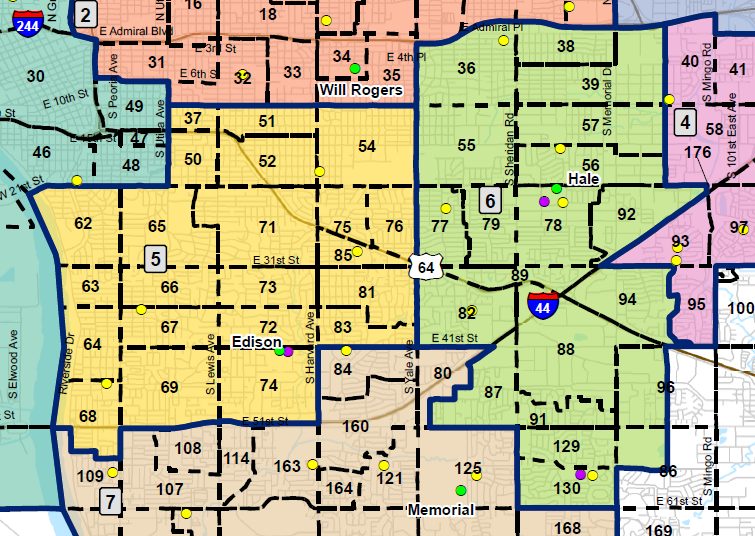
Last time I posted campaign contributions and expenditures for school board races, before the February primary, I had to go to the Education Service Center, to the school district clerk's office, and take photos of the reports. This time, that wasn't going to be possible or advisable, given everyone's desire to minimize contact, so I filed an open records request through the Tulsa Schools website and sent an email directly to district clerk Sarah Bozone. I have yet to receive a reply.
UPDATE 2020/06/29: At 9 a.m. the day before the election, TPS has responded to my open records request. I will not have time to turn these PDFs into a tabulated account of campaign contributions, so you will have to look at them yourselves. I have taken the files provided, given them more meaningful file names, and run them through OCR, but that's it. Each file contains all of the ethics reports filed by the candidate during this campaign.
- District 5: John Croisant
- District 5: Scott Pendleton*
- District 5: Shane Saunders
- District 6: Ruth Ann Fate
- District 6: Jerry Griffin
*Pendleton finished third in the primary. He was the only candidate not advancing to the general who managed to raise and spend enough money to be required to file ethics reports.
I shouldn't even have to ask: When the clerk receives a report, it ought to be immediately scanned in and posted on the district website. Better yet, let's fix the law so that all candidates and campaign committees in the state use the Oklahoma Ethics Commissions's electronic filing system. Currently, county candidates file ethics reports with their county election board, school board candidates file with the district clerk, municipal candidates file with the city clerk. Having one system with a consistent interface and electronic records would serve everyone better -- except perhaps for candidates with something to hide.
Which brings me back to the topic. Knowing that I was unlikely to get a timely reply from the district clerk, I emailed the candidates directly on Tuesday, requesting their ethics reports, asking who had endorsed their campaigns, and asking for their opinion on the plan to extend Superintendent Deborah Gist's contract for an additional three years in a snap vote one week before new school board members would be elected.
All four candidates responded, but only two, Shane Saunders, candidate for Office 5, and Jerry Griffin, the Office 6 challenger, both Republicans, sent me their campaign contribution reports. Office 5 candidate John Croisant and 24-year Office 6 incumbent Ruth Ann Fate, both Democrats, said that they had filed their reports with the district clerks -- a very passive-aggressive response.
Three of the four objected to the school board voting to extend Gist's contract right before the election; Fate, the incumbent, wrote, "I will be making my decision tonight." Only two of the seven school board members, Jennettie Marshall and Stacey Woolley, voted against the contract extension. Next week that vote might have been 4-3 against extension.
Endorsements reported to me by the candidates:
- Tulsa World: Croisant, Fate
- Tulsa Regional Chamber: Saunders, Fate
- Tulsa County Republican Party: Griffin
- American Federation of Teachers: Griffin
Griffin has also been endorsed by John Remington, the third-place candidate in February's primary.
Notable contributors during this reporting period: Shane Saunders received contributions from his erstwhile boss, former Congressman John Sullivan (Saunders served as Sullivan's press secretary), and from former Tulsa Mayor Robert J. LaFortune. Jerry Griffin received a contribution from the Tulsa County Republican Party; parties are allowed to help candidates running in non-partisan elections. Griffin also received a donation from the American Federation of Teachers.
Please read my previous report on the pre-primary contributors to all of the Tulsa School Board candidates, including the two who are refusing to provide BatesLine with copies of their pre-general reports.
Contributors and vendors are from Tulsa unless otherwise noted. If you're reading this on the home page, the lists for each candidate are after the jump.
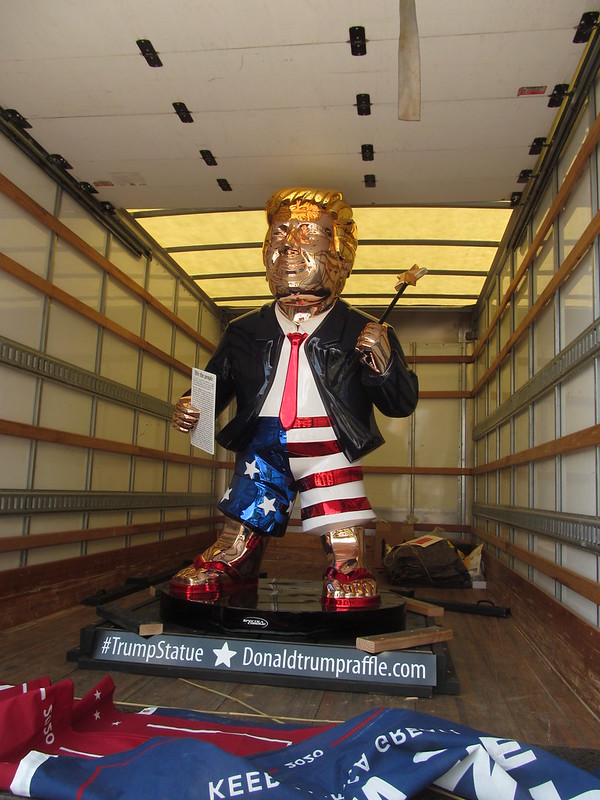
My family would like to have gone to the rally, but it was too soon to want to be around 18,000 people, or to stand outside for hours in the hot sun without a good chance of getting in. Hearing about hundreds of thousands of ticket requests reinforced the feeling that it would have been unpleasantly crowded and possibly futile.
We decided to drive downtown and have a look around. We got into the downtown area at about 2:20 pm. I drove us into downtown on 11th Street, up Boston Ave to 3rd, west to the barricade at Boulder, north and east through the Bob Wills District, north on Elgin through the OSU-Tulsa campus, south on Greenwood to 1st, through the Blue Dome district. I was surprised that there weren't that many cars downtown, especially with so many parking facilities blocked off. It was an early indication that the President might not be speaking to a full house, unless people were shuttled in from remote parking lots by bus. There weren't many people walking around either; I assumed it was because the attendees had already moved into the secured area, since it was nearly time for the doors to open at 3 pm.
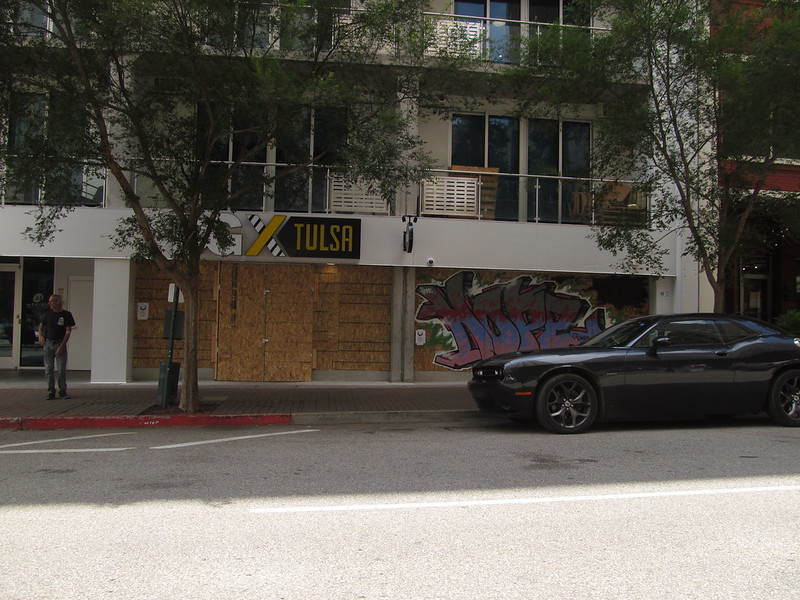
On the west side of Boston Avenue between 5th and 6th, the new DGX (Dollar General Express) store was boarded up, as was Farmer's Insurance, Decopolis, and Jimmy John's. Elote was closing at 4 pm, and Poke Love had a sign saying it would be closed Friday and Saturday. Shops on the east side of Boston weren't boarded up. The vast majority of downtown businesses we passed were not covered with plywood.
At the Greenwood Cultural Center, we noticed a small event involving a few hundred people that seemed to be ending. The Black Wall Street Memorial had been covered and wrapped tightly with a sign that read, "This is sacred ground, not a photo-op." Evidently those responsible didn't want to give Vice President Pence the chance to pay his respects and possibly seem compassionate and human (when they're certain that he isn't).
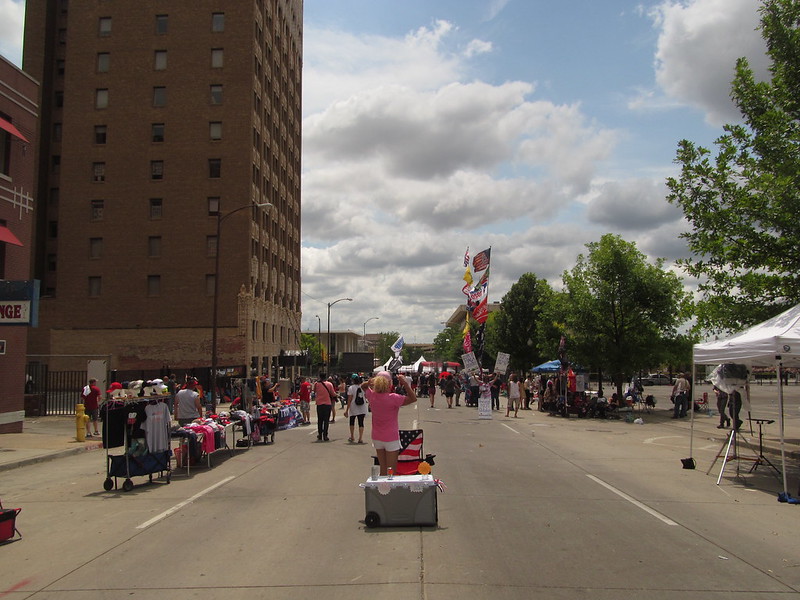
We decided to park and walk around the perimeter to see what was going on. We found a space on 8th Street just east of Main, which was not too far away, and walked up Boulder to where everything seemed to be happening. There were lots of vendors selling buttons and flags, hats and T-shirts, some pro- and anti-Trump protesters and some street evangelists, but no one was blocking the gate at 4th and Cheyenne. Boulder was pedestrianized between 3rd and 5th, and 4th was closed to cars between Boulder and the entrance to the secured area at Cheyenne. We noticed Oklahoma National Guard members staging in the Arvest parking garage at 5th and Boulder. National Guard, Tulsa Police, and Tulsa County Sheriff's Office were visible.
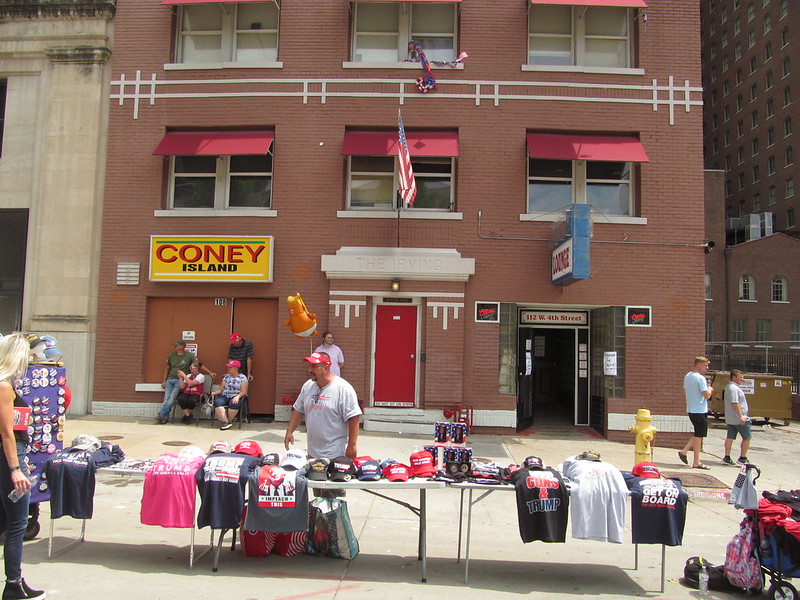
Coney Island was boarded up, but Orpha's Lounge was open for business. There were a few small marquees along that block of 4th, including one belonging to Info Wars, and there seemed to be a broadcast in progress. Nearer to the gate at 4th and Cheyenne there were numerous empty lawnchairs (some folded, some deployed), coolers, and trash, the detritus of those who had arrived early to be first in line to get into the arena.
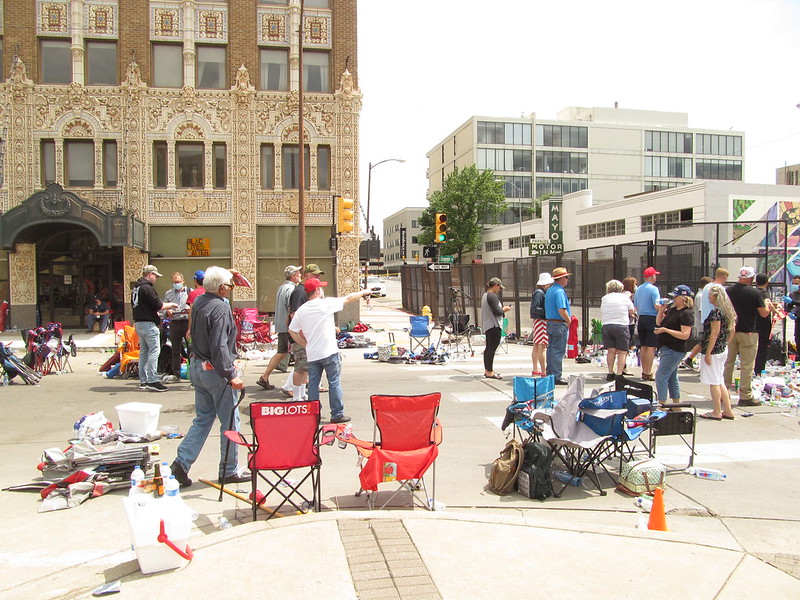
If we'd wanted to, we could have strolled right in at that point and joined the rally. (This was at roughly 3 pm.) There was no line at the gate. As we all have contact with people at particular risk for CCP Bat Virus, we opted not to go in. If we had known how many available seats there were in the upper tier, with room to spread out from other people, we might have chanced it. (If I'd known that Nigel Farage was in the house, I certainly would have gone in.) This was at about 3. We walked back to Main, and north to 3rd to see if we could get a better glimpse of the entrance to the BOK Center, but we couldn't see, as the street was blocked off to vehicles and pedestrians at Boulder, two blocks east. When we came back by 4th Street at about 3:30, it was still clear sailing to get into the gate.
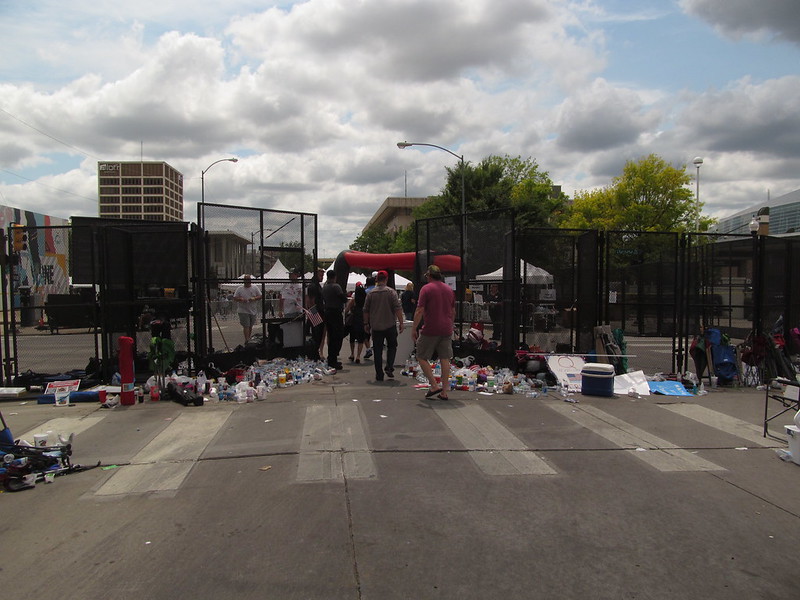
I've heard reports of people being refused entrance, but there's some indication that this occurred around 6 pm. I'm trying to track down reports. My suspicion is that people watching the coverage realized that there was plenty of space available, made their way downtown, but got there after the gates were closed as the President was about to arrive at the BOK Center. Was this a planned closure for security purposes or, as some rumors suggest, because protesters jammed up security to keep more people from getting in? I have been sending messages to some of the people who say they tried to get in but could not, to get details and clarification. (UPDATE: My suspicion has been confirmed by one reply: They were attempting to get in, with tickets, between 6 pm and 7 pm, after their friends had texted with pictures to show that there was still plenty of room. Word was that there were "not enough screeners" and so the gates were closed. Trying to find out what that means and where that information originated.)
Gary Eubanks, who had made it into the secured area, noticed that around 5 o'clock that no one was manning the temperature screening station, and you couldn't go on to the Secret Service security checkpoint until you had been checked for a fever. He also said that every other seat in the arena had been blocked off initially, and that even after passing through the temperature and security checkpoints, attendees were being held outside the BOK Center entrance and only allowed into the building in groups of 100 at long intervals. I have reached out to BOK Center and ASM Global, which has the contract to manage the center, for their response to these reports and for a timeline of changes affecting those attempting to attend the rally.
Back to our journey: After we got back to our car, a little before 4 pm, we drove down Boston Ave. -- Mrs. DeHaven's Flower Shop and The Gadget Company were boarded up -- and noticed a Trump Baby balloon floating above 18th and Boston. When we got there, there were two balloons. A counter-event in Veterans' Park had a few marquees set up and a handful of people; this was at about 4 pm.
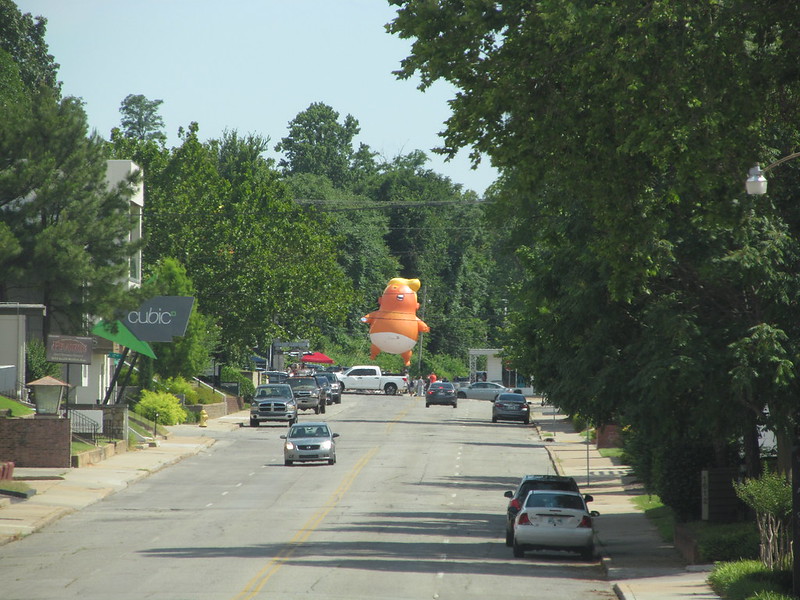
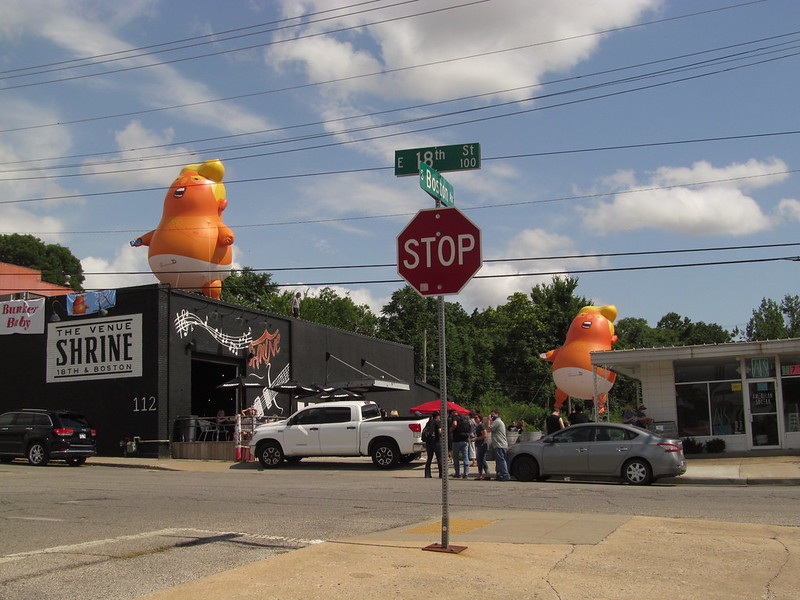
My complete album of photos and videos from outside the Trump Tulsa rally is here on Flickr.
MORE: Tim Murtaugh, communications director of Trump 2020, tweeted video of an MSNBC report of protesters causing the 4th and Cheyenne gate to be closed not long after we left the area. Here's what the MSNBC reporter said; the time bug on screen indicates 4:03 to 4:04 pm CDT.
And again, one of these gates -- there are three places where you can enter to get to the BOK Center, three gates -- this one has now been shut, because there was some kind of incident, there were Black Lives Matter protesters who made their way here, and they had a very brief standoff, a very brief standoff with the police, who were backed by the National Guard, and they were slowly moved back. They're still slowly moving that line back. But again, it's forced the shut [sic] of one of those three entry points. You can hear we're now sorta being surrounded by Trump supporters who are trying to get their message out on our air. But the situation here is now a tense one because you have these three different groups that have all converged on this one street, and we're now seeing the National Guard trying to move that crowd back and get these gates open again. The gates at the actual BOK Center are scheduled to open right now. I don't know if that will be delayed, because this entryway, as I said, is now completely shut....
MORE: At 3:42pm, News on 6's Reagan Ledbetter posted video of the 4th and Cheyenne gate being blocked by protesters, with TPD lined up on the other side of the intersection and instructing protesters to back away from the gate. A 3:57pm video shows Oklahoma Highway Patrol troopers instructing the crowd that they had to back up past the alley (about 160 feet away) before the troopers would allow the gate to be reopened.
STILL MORE: Citizen-journalist Drew Hernandez has video of altercations in downtown Tulsa before and after the Trump rally.
EVEN MORE: David Van Risseghem of Sooner Politics has some thoughts on the real reasons attendance was so low and includes his experience (twice) of the checkpoint process. (I'm inclined to agree with his thoughts.) He also captured video of an attack on a Trump supporter waiting outside the BOK Center on Thursday.
Postdated to remain at the top of the blog until the polls close at 7 p.m.

Today, March 3, 2020, is the Oklahoma presidential preference primary. Oklahoma is one of 14 states (Alabama, Arkansas, California, Colorado, Massachusetts, Maine, Minnesota, North Carolina, Oklahoma, Tennessee, Texas, Utah, Virginia (Democrats only), and Vermont) holding a presidential primary on "Super Tuesday." American Samoa Democrats will also hold a territorial caucus on Tuesday.
Super Tuesday came into existence in 1988, driven by southern Democrats. After a win in the post-Watergate election of 1976, with a ticket headed by former Georgia governor Jimmy Carter, Democrats were wiped out in 1980, as Reagan beat Carter, and again in 1984, as Reagan won 49 states against former VP Walter Mondale. The worry was that the early states (Iowa and New Hampshire) tilted the playing field in the liberal direction, resulting in a liberal nominee.
The Democrats' practice of "superdelegates" was another reform aimed at the electability problem that traces back to the reforms prior to the 1972 convention. The idea was that Democrats who had actually been elected office would help shift the convention and the selected nominee in a more centrist direction than Democrat primary voters left to their own devices.
The hope was that a Southern regional primary early in the process would encourage the nomination of a Southern moderate who could win in November. Oklahoma's Democratic governor and legislative majorities went along with the plan; previously, both major parties used the caucus and convention system to elect national delegates from Oklahoma. As it happened, of the 13 Southern states voting, Jesse Jackson won the four Deep South states (LA, MS, AL, GA) plus Virginia, Al Gore won five border states (OK, AR, TN, KY, NC), Michael Dukakis won Florida and Texas, and Dick Gephardt won his home state of Missouri. Dukakis's wins in the south, plus success in his home region of New England, killed Gore's electability argument.
(Virginia Republicans will not hold a primary but will use the caucus and convention process: County and Independent City Republican parties will elect delegates to the Congressional District and State GOP Conventions, and the CD and State Conventions will elect delegates to the Republican National Convention. All of Virginia's 48 delegates will be pledged to the candidate winning the presidential preference vote of delegates at the Virginia State Republican Convention.)
In Oklahoma, each political party may opt to allow voters not registered with a party to vote in their primary. For 2020 the Oklahoma Democratic Party is allowing independents to vote in their primaries; the Republican and Libertarian party primaries will be open only to voters registered with the respective party.
Oklahoma Democrats will have 15 candidates to choose from, all mainstream enough to earn a spot on a debate stage at some point. They're shown below in the order in which they filed for the primary back in December.
- Tulsi Gabbard
- Amy Klobuchar
- Elizabeth Warren
- Bernie Sanders
- Kamala Harris
- Pete Buttigieg
- Andrew Yang
- Deval Patrick
- Michael R. Bloomberg
- Tom Steyer
- Joseph R. Biden
- Michael Bennet
- Marianne Williamson
- Julián Castro
- Cory Booker
Only five are still actively campaigning: Gabbard, Warren, Sanders, Bloomberg, and Biden. (Klobuchar, Buttigieg, and Steyer dropped out after poor showings in South Carolina last Saturday.) All of the Democratic candidates take an extreme position in support of abortion. They all support greater intrusion of the federal government into every aspect of life. Each of the Democratic candidates wants Christians either to bow down before the gods of the Sexual Revolution, or have the Federal Government destroy their businesses, their professional careers, their schools, their churches, their private organizations. None of them are "moderate." Given the number of conservative rural Oklahomans who are still registered as Democrats, a candidate that, say, supported private spaces and protected athletic opportunities for women, opposed late term abortion, supported robust protections for religious liberty, and sensible policies on immigration and trade -- someone like Louisiana governor John Bel Edwards -- would do very well in the Oklahoma Democratic primary.
Although you can still vote for any of the candidates on the ballot, a candidate needs at least 15% of the vote in a congressional district or statewide to get any delegates at all. In South Carolina, Biden got 49% and Sanders 20%, but split all of the delegates between them because the rest of the candidates split the remaining 31% of the vote, with none of them topping the threshold. Steyer's 11.3% was the best of the rest. Very little polling has been done in Oklahoma. A Sooner Poll taken from 2/17 to 2/21 put Biden at 21.2%, Bloomberg at 19.8%, undecided at 19.3%. Buttigieg and Klobuchar, both now out of the race, combined for 17%.
For Oklahoma Democrats, each congressional district has a different number of delegates: CD 2 and CD 3 have four each, CD 1 and CD 4 have five each, and CD 5, with a Democrat congressman, has six. There are 13 seats pledged based on statewide results: 8 statewide at-large delegate seats and 5 seats belonging to Party Leader and Elected Officials (PLEOs). Five more PLEOs go as superdelegates -- the Oklahoma Democrat chairman and vice-chairman and the national committeeman and national committeewoman, plus Congressman Kendra Horn. The "superdelegates" aren't pledged to any candidate, but they won't be able to vote unless no candidate receives a majority of the delegate vote on the first ballot at the National Convention. (I am still trying to find out who the pledged PLEOs are and why we have five. In other states, the number of unpledged PLEOs is different from the number of pledged.)
Oklahoma will have 43 delegates to the Republican National Convention, three from each congressional district, plus 28 statewide, including the state party chairman, the national committeeman, and the national committeewoman. If a candidate wins more than 50% of the vote in a CD or statewide, he gets all the delegates for that jurisdiction, even if another candidate breaks 15%, which seems unlikely.
Five Republicans are challenging President Trump on the Oklahoma ballot.
Zoltan G. Istvan, 46, of Mill Valley, CA: Istvan is a transhumanist who wants Republicans to embrace the unfettered use of technology to modify humanity. He believes science and technology can solve all problems. He writes, "The fate of fiscally conservative Republicans rests in embracing transhumanism and become more open-minded to cultural and technological change--or the far-left will own the future, just like they already own the environmental movement. The GOP must embrace radical innovation in the human being and be the caretakers of humanity's brave future." Istvan also wants to "improv[e] the Constitution to make it more malleable and ready to adjust every few years to radically changing times and accelerating technology." Call him the "Brave New World" candidate.
Roque "Rocky" De La Fuente, 65, San Diego, CA: He ran as a Democrat on the 2016 Oklahoma ballot, and his son ran as a Democrat in New Hampshire this year, but he's on the GOP ballot in Oklahoma in 2020. In 2016, he was also the presidential nominee of the American Delta Party and the Reform Party, which was founded by Ross Perot. De La Fuente tends toward an open-borders view: "We need comprehensive immigration reform that views undocumented workers as assets rather than liabilities. It is not logical to suggest that we can deport 13 million immigrants in a way that would be deemed fair. It is just as illogical to suggest that we could deport the small percentage of undocumented immigrants who have committed felonies." He wants to raise the retirement age and the contributions cap to keep Social Security solvent.
Matthew John Matern, 54, Manhattan Beach, CA: Matern is an attorney. He wants to solve homelessness by giving people a $10,000 tax credit for taking in a homeless person. He wants to raise the threshold for taxable income to $50,000 for individuals and $100,000 for families. Matern wants to focus on the environment, including a tax credit for reducing carbon footprint and tariffs to penalize goods from major polluters like India and China. He wants a pathway to citizenship for illegal immigrants.
Bob Ely, 61, Vernon Hills, IL: Ely is running as a something of a tongue-in-cheek, satirical candidate, "your least-worst alternative." He calls himself partyfluid, says he has no experience and the charisma of a doorknob. His political pronouncements are the sort of thing your opinionated uncle might shout at the TV while watching the news after a few beers. Ely claims he would be a "better" (and scarier) Trump:
A federal judge I know decried how Trump was subverting the rule of law. I told him I could do much worse. He said that was impossible. How about this, I said:
- In some random speech or tweet I would state: "A human virtue I admire most is loyalty. I am loyal to those who are loyal to me." An unimpeachable statement.
- My sleezy [sic] friends would understand Omertà .
- I would let those who cooperated with Mueller rot in prison; I would pardon those that stayed silent. My smarter sleezy friends would figure out that the easiest strategy would be say nothing; plead guilty; get pardoned.
The judge conceded that would be worse.
On foreign policy, Ely believes that sanctions against international bad guys are ineffective, and that instead, on a case by case basis, America should choose between resigned acceptance and putting a Tomahawk through a dictator's bedroom window, pour encourages les autres. On illegal immigration, Ely supports amnesty and guest worker visas for low-income jobs. Ely doesn't want you to follow him on Twitter or friend him on Facebook.
Joe Walsh, 57, Washington, D.C.: Walsh is a former congressman who suspended his campaign for the Republican nomination after a poor showing in Iowa and is now begging his supporters to vote for Democrats in order to unseat Trump. He won a seat in Congress by a slim margin in 2010, then lost it in 2012, after making light of the war injuries of his Democratic opponent, Tammy Duckworth. He spent much of his presidential campaign apologizing for outrageous things he said as a radio host.
Also on tomorrow's ballot: Seven counties in Oklahoma -- Creek, Cleveland, Kingfisher, Muskogee, Oklahoma, Tulsa, and Washington -- will vote whether to allow liquor stores to open on Sundays. Since supermarkets can now sell strong beer and wine, and they can sell on Sundays, and since people can buy liquor by the drink at bars and restaurants, it seems only fair that liquor stores should be able to compete on a somewhat level playing field. It seems to me that it's safer for everyone if people buy alcohol at the store and take it home to consume, rather than drinking at a bar or restaurant and then having to get home somehow.
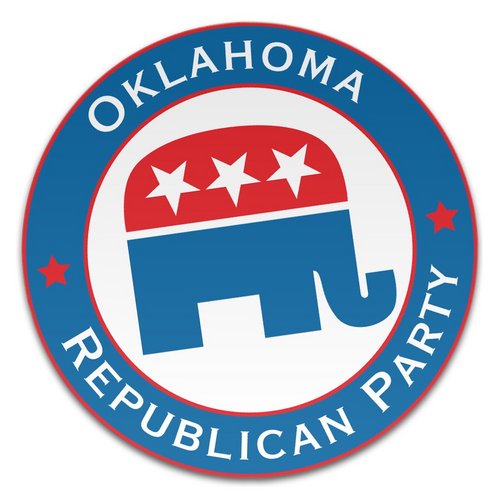 This Thursday night, January 30, 2020, starting at 6 pm, the Tulsa County Republican Party will hold precinct meetings, the first stage in the process for selecting delegates to the Republican National Convention and developing a party platform. The meetings are open to all registered Republicans.
This Thursday night, January 30, 2020, starting at 6 pm, the Tulsa County Republican Party will hold precinct meetings, the first stage in the process for selecting delegates to the Republican National Convention and developing a party platform. The meetings are open to all registered Republicans.
To simplify the logistics, all but four precincts will gather at twelve regional meetings, mostly at public libraries. Here is the complete list of Tulsa County Republican Party 2020 precinct meeting locations.
The Oklahoma Republican Party hold precinct meetings in every odd-numbered year for the election of precinct party officials and as the first stage in the process for electing county and state party officials, but in presidential years, the focus is on the road to the Republican National Convention.
Precinct meetings have two main orders of business:
(1) Elect delegates to the 2020 Tulsa County Republican Convention. Each precinct is allocated a number of seats to the convention based on the vote for the Republican nominee for governor in the previous election. The county convention will elect delegates to the 1st Congressional District Republican Convention and the Oklahoma State Republican Convention. The Congressional District conventions each elect three delegates and three alternates to the national convention; the remainder of our delegation is elected by the state convention, which also elects a man and a woman to represent Oklahoma for the next four years on the Republican National Committee, the party's permanent governing body.
(2) Debate and approve resolutions for inclusion in the party platform. Interested Republicans can join the Tulsa County platform committee, which takes platform planks proposed by the precincts, crafts them into a county party platform which is then debated and voted on at the county convention. County platforms are used to develop a state platform, and state platforms are used as a basis for the development of the national platform.
A precinct meeting's duration depends on the number of people who show up for a particular precinct and how many issues they want to discuss, but typically you'll be done within an hour or so.
For more information, contact the Tulsa GOP headquarters at 918-627-5702.